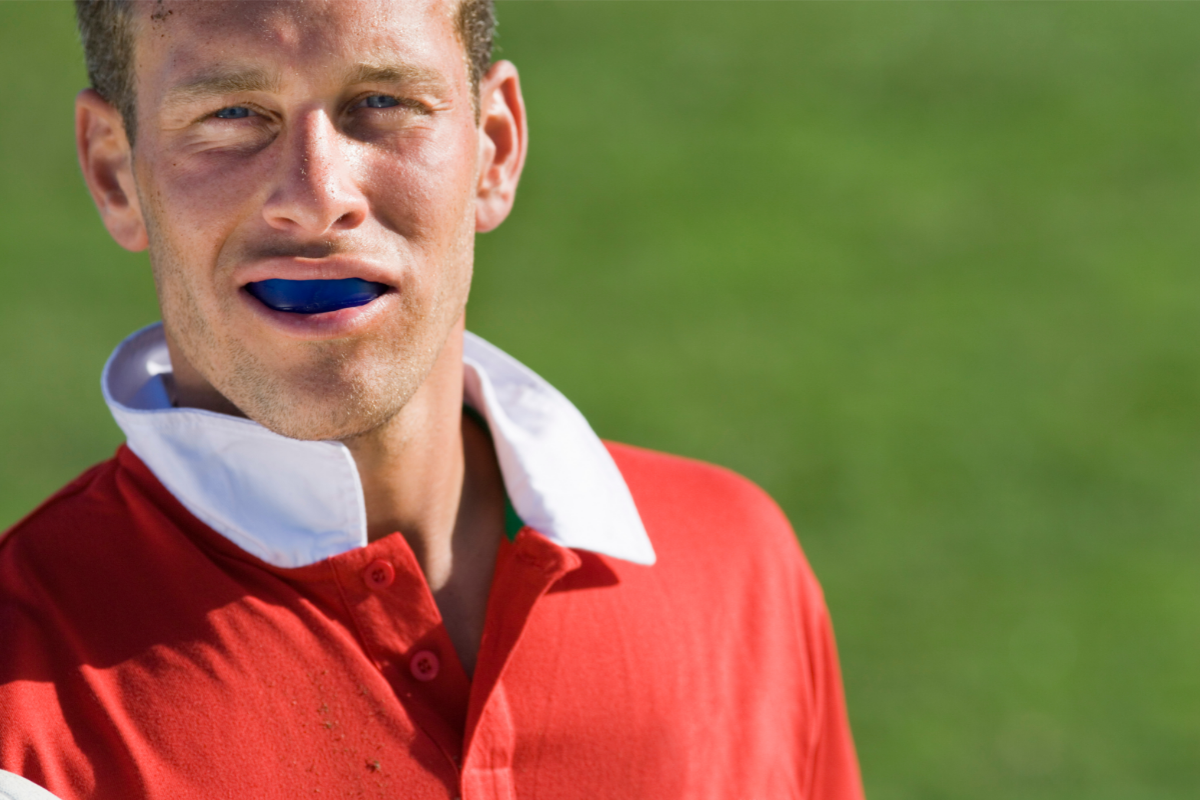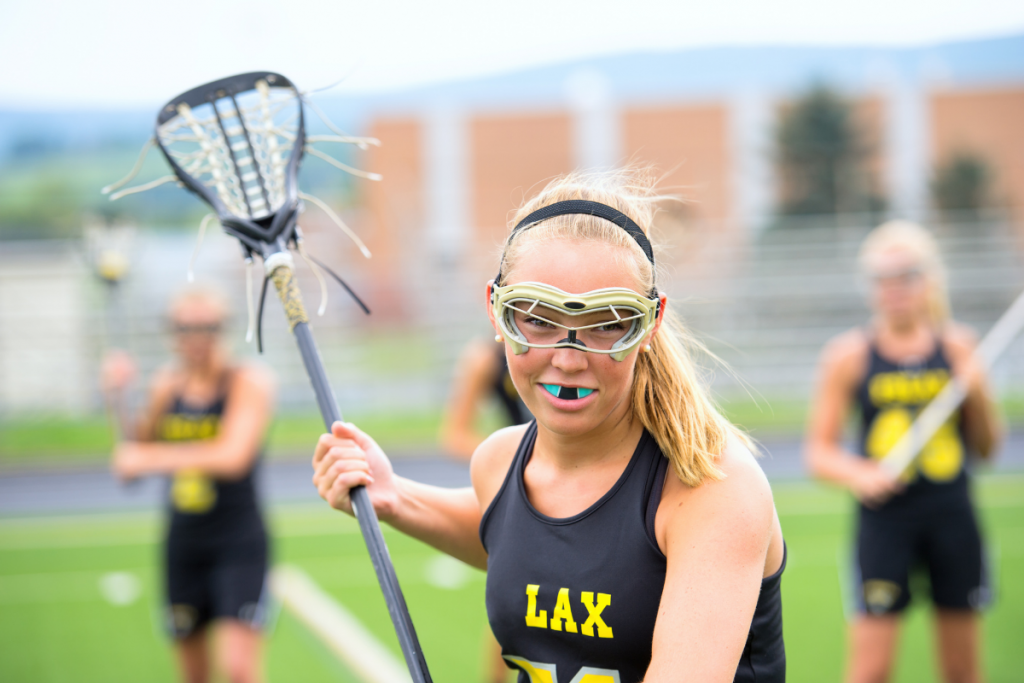Protecting your teeth with mouthguards

Thousands of dental injuries per year end up in Australian emergency departments, with 71% of them occurring in the under 25s. With a mouthguard, a dental injury is 60% less likely, yet only a third of children aged 5-17 wear mouthguards when playing contact sports. And there’s no doubt we’re a sporting nation. Some countries consider us sports mad! Aussie Rules Football is our most popular game, with over seven million of us playing each week. That’s a lot of skin in the game and a lot of mouths to protect!
First invented in the 1890s for the boxing profession, mouthguards are one of the most important devices we can wear to protect our teeth and jaws. Playing contact sports without a mouthguard can result in broken or knocked-out teeth, altered alignment or displacement of teeth and jaws, fractured jaws, jaw dislocation, torn lips, gums and tongue, as well as facial disfigurement. Dental injuries from sport accidents are often painful and can be the most difficult and complex to treat. These injuries can take a lifetime of ongoing expensive treatments to repair.
A higher prevalence of injury occurs in contact sports, but non-contact sports and leisure sports also run the risk of accidental collision and dental injury. Dentists and sports specialists recommend mouthguards be worn by athletes in competitive and recreational sports where full contact is likely to occur or where there is risk of serious injury to the mouth.
Sports requiring a mouthguard
- Boxing
- Football
- Rugby
- Cricket
- Lacrosse
- Hockey
- Wrestling
- Martial Arts
- Soccer
- Water polo
- Basketball
- Netball
- Cycling
- Softball
- Horse riding
- Roller blading
- Extreme sports
Limited contact sports where mouthguards should be worn include squash, volleyball, baseball, underwater hockey, skateboarding, riding scooters.
For years mouthguards have been accessible over the counter at pharmacies often with a choice of small, medium, or large, however not everyone can fit them, and they don’t mould over braces. Generally, they became uncomfortable or just a poor fit. Today’s recommendations are for custom made mouthguards.
Custom made dental mouthguards
The best type of mouth protector for any athlete is a custom made mouthguard. These appliances are made in a dental laboratory specifically to fit the person who is going to wear them. After an impression of the teeth has been taken, a single sheet of EVA, (polyvinyl acetate), is placed over the mouth mould and a special pressure vacuum evenly shapes the material precisely to cover and contour each tooth and shape the mouth. Custom made mouthguards have better retention and therefore, better protection.
Pros and cons
- Well designed and exact fit to the athlete’s mouth.
- More retentive and protective.
- More comfortable and less obtrusive.
- Come in any size and can be personalised in colour, logo and name.
- Easily adjusted by a dentist.
- Breathing and speaking is easier than over-the-counter mouthguards.
- Can be worn by athletes undergoing orthodontic treatment.
- Recommended by the Australian Dental Association.
- Cost more than pre-formed.
Pre-formed boil and bite dental mouthguards
Made from thermoplastic, a pliable plastic that is pre-formed, these mouthguards can be purchased from pharmacies and shops. The athlete first places the appliance in warm water until it softens and becomes pliable, then the pre-form is squished into place over the teeth and gums using fingers, lips, tongue, cheeks. A gentle biting pressure is applied until it becomes seated and contoured over the teeth and arch of the mouth.
Pros and Cons
- Often cheaper than custom made.
- Limited in size often results in a poor fit.
- Bulky and are less retentive, loose fitting around teeth and gums, providing less protection.
- Require hand moulding which can result in uneven thickness of material and uneven protection.
- Can’t be adjusted or remoulded.
- Can impede breathing and speaking.
- Can’t be worn with braces.
- Can be easily dislodged during contact sport if not correctly moulded.
Caring for your mouthguard.
Do not bend or squash or chew mouthguards. This reduces their life and promotes weakness, distortion or tears in the materials which will reduce protection to your teeth.
After every use clean with a soft toothbrush and soapy tepid water. Gently brush the mouthguard and rinse well.
Store safely in a rigid plastic case to protect from both damage, dirt and sunlight during transporting. A ventilated container provides airflow avoiding bacteria and fugal growth. If the container looks dirty, wash it with a mild antibacterial soap in warm water.
Using a denture cleaner once a week. This provides a deeper antibacterial cleanse to the material further reducing any bacteria.
Be careful using toothpaste or mouth wash. Toothpaste is abrasive and can damage the guard. Hard toothbrushes can cause fine abrasions that can build up over time and compromise the mouthguard so use a soft toothbrush.
Avoid high temperatures, such as hot water, hot surfaces, hot cars or direct sunlight as heat can cause distortion.
During the game, avoid drinks containing sugar as the mouthguard can hold sweetened liquid close to your teeth for periods of time which can contribute to tooth erosion and tooth decay.
How long do they last?
With the correct care and protection, custom made mouthguards can last 3 to 5 years. However, they have a pretty hard life in the mouth with bacteria and general wear and tear. It’s recommended to have your mouthguard checked before each sport season starts by your dentist so they can see if the guard is fitting well, needs adjustment or replacement. As children and teenagers grow so do their teeth and jaws. Tooth alignments change, braces or orthodontic appliances are added or removed resulting in the need for a new mouthguard.

The Australian Dental Association recommends custom made mouthguards for anyone participating in a contact or non-contact sport where there is a legitimate risk of tooth or facial injury. Accidents happen when we least expect it. Dental injuries are painful and teeth are often costly to treat or replace. Prevention always far out-weighs and exceeds the cost of any mouthguard you buy.
The Health Hub is your one-stop-shop for custom mouthguards. Not only can we advise you on the best option for you and your sport, our on-site laboratory produces quality mouthguards in super-quick time! Book a consultation today.
